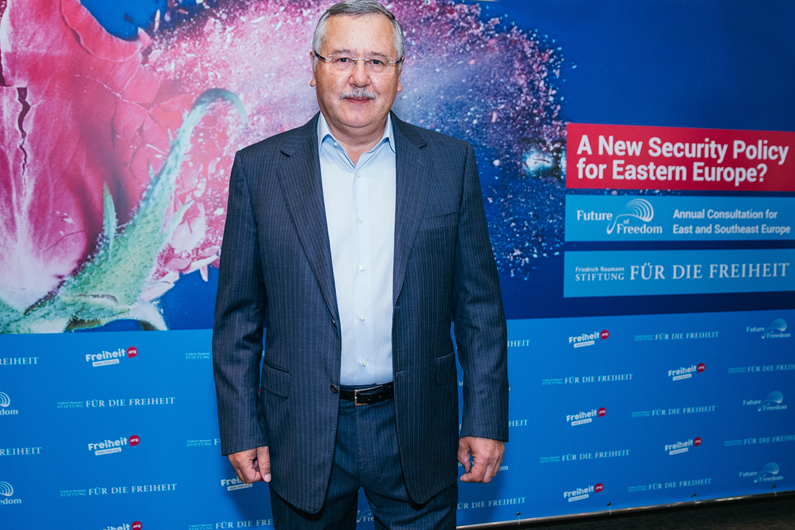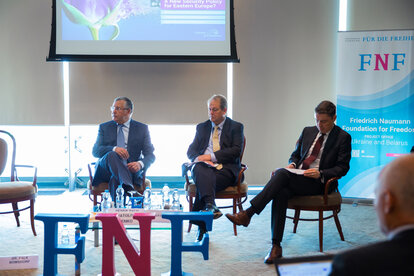Military
Ukrainian Former Defence Minister about the Russian Military Provocation

Operation "Zapad", a big military drill run by Russia, started on 14 September at the Eastern border of the European Union in Belarus. What is the Ukraininan perspective on this Russian large-scale military training? What is Kremlin trying to achieve with the drill?
1. Dr. Grytsenko, since the last large scale military trainings conducted by Russia resulted in a 5-day war in Georgia in 2008 and the annexation of Crimea in 2014, do you think this time the war games in Belarus are again a sign of their political aspirations toward this region or merely a part of their propaganda of demonstration of power with the intention to cause a hysterical reaction within NATO?
"I would agree with the second thesis in your question. There is no doubt that Russia will further pursue its aggressive stance and policy in Europe, but I do not believe that these military exercises will provoke any serious military threat. First, they run such exercises regularly. Second, military observers, including from NATO member states will be present there. Finally, at this point of time Putin does not need to start any large-scale military campaign. He has already achieved his aggressive objectives in Ukraine (annexed Crimea, controlled part of Donbas, in fact divided and weakened Ukraine), so he will rather push on Ukraine and its western partners diplomatically, trying to strengthen his control over the country based on the Minsk-2 provisions."

Dr Grytsenko as one of the keynote speakers at Future of Freedom Consultation
2. From a Russian perspective NATO and Western governments have used the popular anti-Russian uprisings to their advantage, do you think that Kremlin is using this exercises to put Lukashenko under pressure and guarantee his loyalty, as well as to also discourage any opposition?
"To a certain extent, yes, although Lukashenko, who during the Russian war against Ukraine, was able to partly renew his image in Europe, would try to distance himself and his country from Putin's aggressive intentions toward Ukraine."
3. What are your personal expectations from the exercises? Do you think Russia will show a reformed, well-structured army?
"To be frank, I do not care what they are planning to show. We, Ukrainians, must rather focus our efforts and resources to enhance combat readiness of Ukraine's own army, despite those exercises and trainings of the aggressive neighbour."

The Highlight Topics at the Future of Freedom Consultation
4. What is the Ukrainian perspective as a non-NATO country in regards to the upcoming big military trainings?
"Our defence and intelligence communities must and certainly will keep an eye on any military activities close to our borders."
Dr Anatoliy Grytsenko, Leader of the Civic Position Party, former Defence Minister of Ukraine (2005-2007), was one of the keynote speakers at the Future of Freedom consultation of the Friedrich Naumann Foundation, devoted to " The New Security Policy for Eastern Europe?", which took place in May in Eastern Ukraine.
Dr. Anatoliy Grytsenko is the leader of the Civic Position Party, former Defence Minister of Ukraine and Chairman of the Parliamentary National Security and Defence Committee, Colonel (Ret.). Dr. Grytsenko took part as a Presidential candidate in the 2010 and 2014 elections in Ukraine. As a Minister of Defence, Dr. Grytsenko accomplished a number of recognized reforms towards building a strong professional Ukrainian military, interoperable and compatible with the NATO armies. Among the most prominent reforms are: drafting of the State Program for the Development of the Armed Forces of Ukraine for 2006-2011; strengthening the Ukrainian military ethos and patriotism; streamlining command and control system, in particular, creation of the Joint Operations Command; transformation of the military logistical system towards the modern economic and market economy standards.
Dr. Grytsenko holds PhD in Technical Sciences. He is the author of 100+ publications, including those issued in Belgium, the Netherlands, Germany and Switzerland. He led all the Razumkov Centre 2000-2004 projects, which included not only defence, but also political, economic, social, energy and other research areas.